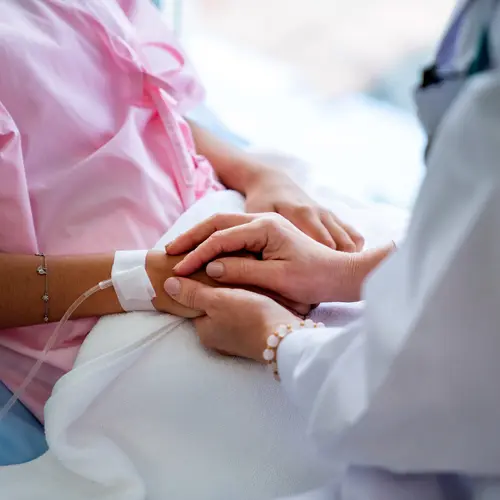After her breast cancer diagnosis and mastectomy in 2004, Cheryl Hartman of Lilburn, GA, needed to see an oncologist for further treatment. She set up an appointment with the doctor her surgeon recommended.
“This oncologist was so focused on doing chemotherapy that he didn’t listen to me when I said I didn’t want it," she says. "He was also upset that my mother only had radiation, even though she was a 9-year survivor of her cancer.”
Hartman looked for a second opinion. The second oncologist she saw also suggested chemotherapy. But this time, the conversation went differently.
“I told her that I was not a fan of chemotherapy, and she said, ‘I believe chemotherapy works. But I also believe that you need to believe in your treatment.’”
After her doctor explained the science behind her treatment options, Hartman agreed to be part of a study. Her treatment was successful.
“I was incredibly glad that I changed oncologists,” Hartman says. “I could have gone to the first oncologist, lived my life based in fear, and gone through chemotherapy if I had not listened to my gut reaction. My cancer was in 2004 and I’ve had no recurrence, so I now am considered a survivor.”
Jason Parrish of Fairfield, CT, sought a second opinion after his doctor told him he’d only need radiation to treat his testicular cancer. He wanted reassurance he was doing enough.
“The first oncologist was a radiologist and said he could handle all treatment. I went to see a doctor who did chemotherapy to make sure he agreed radiation was really all I needed. He said, ‘You don't need me, you're in great hands.’ It was a good experience and gave me peace of mind.”
For Hartman, getting a second opinion was a matter of not connecting with or feeling heard by a doctor. For Parrish, it was a double-check that gave him more confidence in his treatment choice.
Your reason for getting a second doctor to weigh in on your cancer diagnosis and care may be as simple as wanting as much information as possible. But you may also want another opinion to:
- Make sure your diagnosis is right
- Find out more about the type, stage, and location of your cancer
- Talk to a doctor with expertise in your cancer
- Explore other treatment options
- See what clinical trials might work for you
Getting Your Second Opinion
Lawrence "Rusty" Hofmann, MD, is the head of interventional radiology at Stanford University School of Medicine. His advice on second opinions? Good things are worth the wait.
“When you get diagnosed with cancer, the world stops, and you want to get it addressed today,” says Hofmann, who's also co-founder of Grand Rounds, a company that connects medical experts with folks all over the country for more accurate and successful care.
This anxiety can lead to quick decisions, he says, and your outcome may not be as good as a result. It’s important to take the time -- and talk to the right people -- to do things right.
“Your cancer has likely been there for months, if not years. So waiting another 2 or 3 weeks to go through the proper channels and find the right treatment for you is incredibly important, because fast medicine is bad medicine.”
Part of “getting it right” is choosing the right doctor for your second opinion. Your best bet? Someone who's well versed in the cancer you have -- not just cancer in general.
“If you go from one doctor who’s not familiar with the care for that particular illness to another doctor not familiar, that doesn't really get you what you need,” says J. Leonard Lichtenfeld, MD, deputy chief medical officer for the American Cancer Society.
For example, he says, treatment guidelines for lymphoma have changed dramatically since the early 2000s. A doctor who specializes in it will have a much better grasp on treating it.
“I firmly do believe that for [people] with lymphoma, having a second opinion from a major cancer center that has the experience in treating lymphoma and the diagnosis of lymphoma is helpful to make sure that the treatment being recommended is the most up to date and appropriate,” Lichtenfeld says.
What to Do With the Information
If your second opinion differs from your first, then what?
“There's no rulebook that tells you what to do in that situation,” Lichtenfeld says. One option is to take all the information to a primary care doctor who knows you and is familiar with your health history. She can weigh in on things the specialist may not be able to, like how you’ll be able deal with side effects or how a treatment will fit into your lifestyle.
You may not feel comfortable letting your doctor know about your second opinion. Know that it’s common -- and most doctors welcome it.
“If your doctor gets offended by you wanting a second opinion, maybe you need to find another doctor,” Lichtenfeld says.
When considering which advice to go with, Hofmann says consider if avoiding unpleasant bedside manner -- or a doctor with a bad online review -- is worth your health.
“Obviously, doctors can do a better job in being more compassionate and a better communicator, but if you ask my 18-year old son whether he was a big fan of me on Saturday night when I made his curfew midnight ... well, he’s not,” Hofmann says.
“So there are times where we have to deliver difficult or tough information, or tell [someone] something they don't want to hear that may reflect in reviews.”

